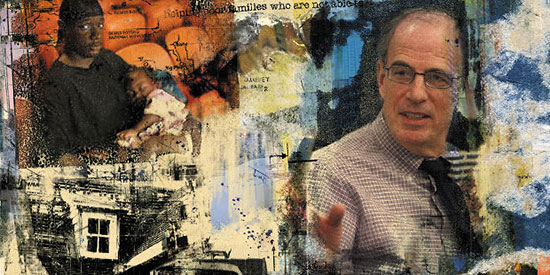Giving children and parents the best chance to remain together
Martin Guggenheim ’71, Fiorello LaGuardia Professor of Clinical Law, has a problem with the way our society approaches child welfare. In particular, Guggenheim believes that working to rehabilitate entire families should take precedence over efforts that focus solely on children’s rights.
His views on such topics inform his work as a scholar—he wrote What’s Wrong with Children’s Rights (2005)—and as codirector of the Family Defense Clinic with Adjunct Assistant Professor of Law Christine Gottlieb ’97. The clinic represents the adult relatives of children removed from their homes by Family Court. Clients, including parents accused of child abuse and neglect, often suffer themselves from addiction, illness and poverty.

Like other NYU clinics, this one is interdisciplinary. In addition to Gottlieb, an attorney in private practice who is formerly a lawyer with the Juvenile Rights Division of the Legal Aid Society, Guggenheim is also joined by a social worker. The three supervise law students and master’s candidates at the NYU School of Social Work as they help clients try to recover their family lives. The advantage of this collaboration is that the law students get to know their clients better, and the team is better able to ascertain the client’s needs and develop a plan to get the client what he or she needs in terms of legal and social services. Other organizations, including New York’s Center for Family Representation and South Brooklyn Legal Services, have replicated Guggenheim’s interdisplinary model (see related stories on pages 6 and 42).
Guggenheim’s 17 years of work with the clinic have helped create a cadre of young lawyers who share his views about the best way to approach the problems of child welfare. He makes no bones about his social justice agenda, which has had an important impact on the lives of former clinic students such as Heather Howard ’97, policy counsel to New Jersey Governor Jon Corzine. Howard has spent the past decade working to develop public policies that strengthen families. “Usually, everyone talks about children’s rights, but I like to get people thinking about defending families’ interests,” she says.
Howard helped develop New Jersey’s Department of Children and Families, and helped create budget initiatives that doubled funding for after-school programs and delivered health insurance coverage to 50,000 children. As a student in the Family Defense Clinic, she represented a mother whose parental rights were terminated due to abuse and neglect of her two daughters. Years later, Howard learned that the mother had reunited with her children after pulling her life back together. “The clinic was the first time I recognized the unfairness in the system,” says Howard. “When the state takes kids away from families, the families are almost always poor.”
Like Howard, many students who participate in the Family Defense Clinic at NYU leave with a deeper understanding of the problems low-income families face in the legal system, where the typical child welfare docket for one judge might include 200 cases a week. Judges commonly adjourn cases for up to 12 weeks, and children languish in the foster-care system for months if not years, while their families wait for a case to conclude. “The real teacher in this course is the client,” says Guggenheim. “Once students learn to care about their clients, they see the world through the clients’ eyes. They see that key actors, including lawyers, caseworkers and judges, treat these people very poorly. There is often a pivotal moment when a student comes to appreciate the difficulty that their clients experience— and comes to understand why so many of our clients would fail if they didn’t have an NYU student working on their cases. After a moment like that, a student sees the world differently.”